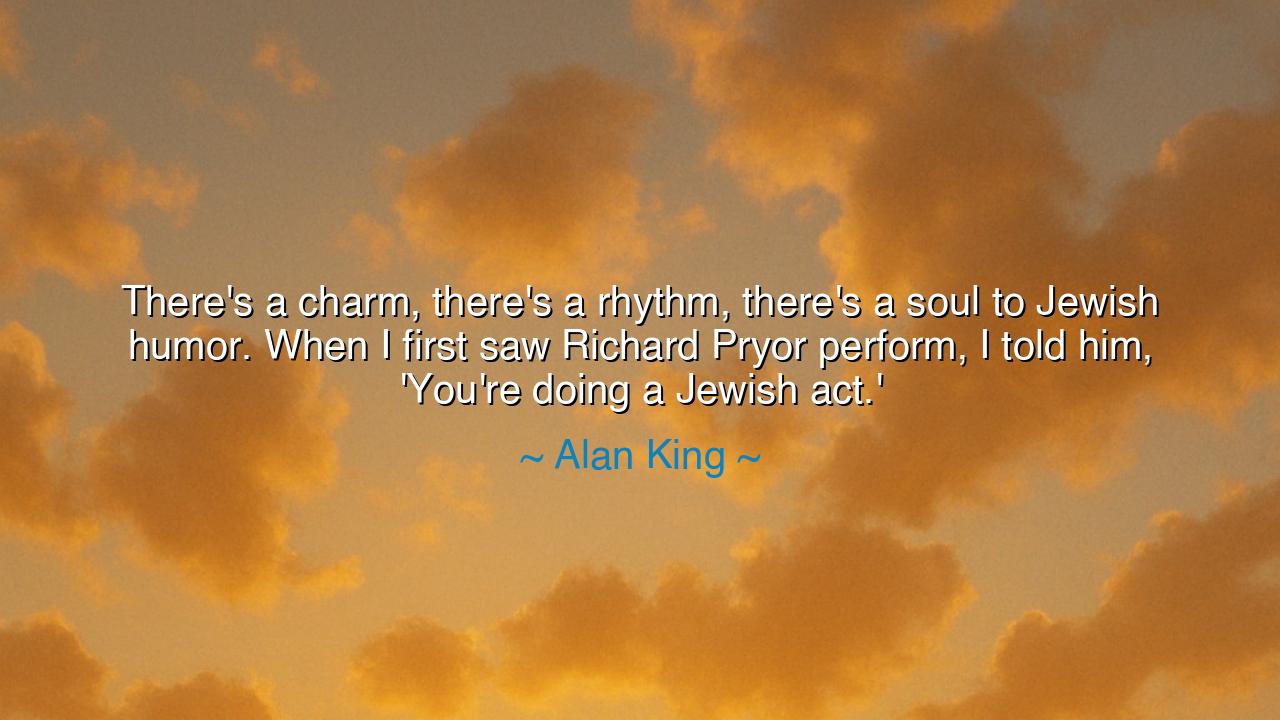
There's a charm, there's a rhythm, there's a soul to Jewish
There's a charm, there's a rhythm, there's a soul to Jewish humor. When I first saw Richard Pryor perform, I told him, 'You're doing a Jewish act.'






When Alan King spoke the words, “There’s a charm, there’s a rhythm, there’s a soul to Jewish humor. When I first saw Richard Pryor perform, I told him, ‘You’re doing a Jewish act,’” he was not merely describing comedy — he was describing the heartbeat of survival. His words unveil an ancient truth: that humor, when born from struggle, becomes more than laughter. It becomes identity. It becomes strength. And it becomes the song through which a people remember who they are. King’s quote honors that sacred rhythm — the rhythm of pain transformed into joy, of sorrow into laughter, of tragedy into story.
In the manner of the ancients, we may say: where others cry, the wise learn to laugh — not because they feel less, but because they feel more deeply. Jewish humor, as King understood it, was never about mere wit or cleverness. It was about survival through grace. It was the laughter of a people who endured centuries of exile, persecution, and displacement, yet refused to let their spirit be extinguished. Their humor, like their faith, carried within it rhythm — the rhythm of resilience. Every joke was a prayer wrapped in irony, every punchline a quiet act of defiance against despair.
When King saw Richard Pryor, he recognized the same sacred fire. Pryor, too, spoke from the depths — from the experience of being both marginalized and magnificent. He transformed suffering into laughter, just as Jewish storytellers had done for generations. That is why King said, “You’re doing a Jewish act.” He saw in Pryor the same rhythm — the soulful humor born from pain, the laughter that both wounds and heals. This is the kinship of oppressed peoples: they share the same rhythm of endurance, the same instinct to turn agony into art, truth into laughter, and humiliation into wisdom.
In every age, the power of humor has been a weapon of the spirit. When the Hebrews wandered in exile, they sang songs and told stories that mocked their misfortune even as they bore it. When they were forbidden to weep, they laughed instead — a laughter filled with tears, a laughter that said, “You cannot take our soul.” So too did Pryor’s comedy, rising from the pain of racism and hardship, become a mirror for humanity’s contradictions. Like the prophets of old, he spoke uncomfortable truths, but wrapped them in laughter so that the heart might receive them. This is the divine rhythm of humor — truth softened by compassion, sorrow redeemed by wit.
Charm, rhythm, and soul — these are the pillars of the humor King describes. Charm is the grace that allows truth to be spoken without bitterness; rhythm is the cadence of survival, the balance between tears and laughter; soul is the depth that gives humor meaning beyond mockery. Together, they create a form of wisdom that is at once human and transcendent. For what is laughter, if not the sound of the spirit rising again after being broken? And what is charm, if not the art of facing suffering without surrendering joy?
Consider the story of Sholem Aleichem, the great Yiddish writer whose tales of Tevye the Dairyman inspired Fiddler on the Roof. His stories brimmed with sorrow — poverty, exile, persecution — yet his characters laughed. They made jokes even when the world fell apart around them. Tevye’s humor was not foolishness; it was faith. “Would it spoil some vast eternal plan,” he says, “if I were a wealthy man?” That line, half lament and half jest, contains the whole soul of Jewish humor: an eternal dialogue with God, both questioning and loving, wounded yet unbroken.
The lesson, then, is this: when life becomes unbearable, learn to laugh — not to deny pain, but to redeem it. Seek the rhythm of your own suffering, and you will find in it a hidden melody. Whether you are scholar or laborer, believer or doubter, your laughter can become your shield and your song. As Alan King and Richard Pryor both showed, the truest humor is born from truth — it is the voice of the soul refusing silence.
So let your laughter carry charm, that it may heal others; let it carry rhythm, that it may remind you to endure; and let it carry soul, that it may outlast all sorrow. For laughter that springs from truth is holy. It is the ancient rhythm of humanity itself — the sound of hope surviving through every generation.






AAdministratorAdministrator
Welcome, honored guests. Please leave a comment, we will respond soon